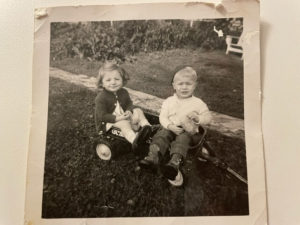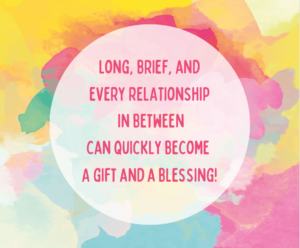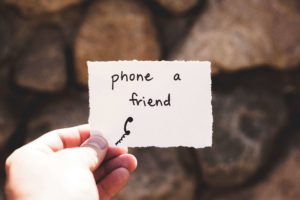This is the fifth stop on our total wellness journey: relational wellness.
Relationships—in all their forms—have been a gift and a blessing since I first arrived on the planet over 75 years ago!
My longest-lasting non-family relationship goes back to November of 1947 when our closest neighbors had their second child, a feisty little girl they named Elaine. I was two months old when we first met which I don’t remember all that well! Elaine and I have kept in touch across the years, using phone, texting, and email, but what I enjoy most are lunches with another close childhood friend at a small local restaurant and meeting at summer concerts in the area to listen to 60’s music! Next time we get together, soon after we return from Florida, we will have more stories, both old and new, than we can’t possibly fit into our time together.

Elaine and Terry
Although there is a unique depth to long-term friendships that have weathered the ups and downs of life, even fleeting relationships can be meaningful. Just last week Rita and I met a young man while walking on one of our favorite trails. We ended up walking the entire five miles together and sharing much of our life journey with each other.
He talked about how much he loved nature, wildlife and being outside. However, his job was behind a desk juggling numbers. At one point I made the comment, “I met a lot of ‘older folks’ over the years who regretted that they didn’t take the risk and change careers into one they loved and looked forward to every day, fortunately I did and it was the wisest decision I ever made (besides asking Rita to marry me)”!
As we finished our walk he turned to us and said, “I don’t believe our meeting today was a coincidence; I believe it was meant to happen. I will think about your challenge for me!”
I handed him my card and asked him to keep me updated on his career journey, which he promised to do. I don’t know if I will ever hear from him again but either way that brief relationship was a gift to me for many reasons!
Long, brief and every relationship in between can quickly become a gift and a blessing if we have the wisdom and courage to remain open to those opportunities.
The importance of relationships to our mental health and happiness are being confirmed by science. Just to lift up one example, the Harvard Study of Adult Development, which is the longest study on happiness ever conducted. It has been ongoing for over 75 years (the 19 remaining original participants are all in their mid-nineties)!
 I encourage you to check it out. If reading up on the study isn’t your thing, at least take a few minutes to listen to the TEDTalk, “What makes a good life? Lessons from the longest study on happiness” which has been viewed over 13,000,000 times!
I encourage you to check it out. If reading up on the study isn’t your thing, at least take a few minutes to listen to the TEDTalk, “What makes a good life? Lessons from the longest study on happiness” which has been viewed over 13,000,000 times!
The study’s current director, Dr Robert Waldinger, describes the findings this rigorous and comprehensive study revealed: “Close relationships, more than money or fame, are what keep people happy throughout their lives….Those ties protect people from life’s discontents, help to delay mental and physical decline, and are better predictors of long and happy lives than social class, IQ, or even genes!” Those results did not surprise me, but rather confirmed what I suspect most of us have come to realize as we accumulate more and more life experience.
However, in order for relationships to become a major contributor to our overall happiness, we must work at keeping them healthy. Relationships that we don’t work at or invest in can quickly go the other way, creating conflict and stress, thus having the opposite effect.
There are several things that are necessary for relationships to thrive, deepen, and move us closer to that point where they nurture and promote that level of happiness the Harvard study predicts.
First, for any relationship to become healthier, deeper and more authentic, we must be willing to invest one of our most valued resources, our time! We can’t possibly nurture any relationship without this ongoing investment. Since it is one of our most valued and cherished assets it is a clear and powerful statement as to how much we value that relationship!
Second, we must be willing to risk and become increasingly more vulnerable. The very best resource I have read on vulnerability has been written by Brene Brown, I highly recommend it!
Again, this level of risking and investing is a very clear and powerful statement of how much we value and to some extent the potential we see in the relationship.
Third, we must be willing to listen more than talk in any relationship we hope to nurture and grow. Personally, this is an ongoing struggle for me. This challenge even applies to our relationship with God! Research has shown that most of us talk to or at God—usually making petitions and requests—far more than listening to God. I wonder what it is that makes the listening prayer more difficult?
Finally, we have to be able to deal effectively with differences and conflict. The last few years we have experienced these at a much higher level in families, friendships, communities, congregations, places of employment, etc. Much of the conflict is around political affiliations, differing religious positions, and a wide and growing number of social issues.
All too often we have retreated to defensive positions, frequently choosing to criticize or attack. Few of us were able to temporarily set aside our positions long enough to listen to the other person in order to better understand why they took the position they did. If we did manage to do that, we seldom found folks with an opposing position willing to do the same. Most of this behavior is based on a growing sense of insecurity. Secure persons don’t judge, get defensive or attack other folks.
The last few years have damaged significant relationships deeply. It will take much work on all of our parts to begin to heal those relationships, but as always, I am the eternal optimist. In the midst of the struggle—which often feels fruitless and futile—I must remember that the most difficult challenges, including strained relationships, hold the greatest potential for growth and transformation.
While these tips—and much of the research—focus on investing in and nurturing our long-term relationships, less attention seems to be paid to new relationships. However, for a variety of reasons, including moving, diverging interests or life paths, and even death, many of our close relationships may end or become more distant over time. If we don’t continually develop new friendships, we may eventually find ourselves lacking the social support network we once enjoyed.
Studies have shown that Americans have far fewer friends than they have had in the past. A Gallup poll in 1990 found that 33% of respondents reported 10 or more friends and only 3% reported none. By 2021, only 13% had 10 or more, and 12% reported no friends at all. The most common response was three in 2021 (down from five in 1990).
I’ve heard many express the difficulty of forming adult friendships and it does often take more conscious effort than it did back in our childhood and youth when friendships seemed to just “happen.” But the good news is we’ve still got those skills, no matter how rusty they are!

Photo by Dustin Belt on Unsplash.com
First, you have to find someone with whom you’d like to develop a friendship. Luckily there are opportunities everywhere! Explore groups with similar interests, such as hiking, biking, kayaking, pickleball, tennis, civic theater, community chorus, book discussion groups, photography, dancing, scrapbooking, model railroading, Bible study, travel groups, exercise groups…the list is endless! Meetup.com has a wide variety of local groups you can join for free. Classes, support groups, and volunteering are also excellent places to meet new people.
Next comes the part that some people struggle with: inviting the promising new acquaintance to a casual get-together to get to know each other better. Sometimes that can feel awkward, scary (see the comments on vulnerability above!), or embarrassing, like it’s admitting you don’t have enough friends already. But there’s nothing to be ashamed of and remember, according to the data, there is a good chance they’re in the same boat!
Even if your invitation is declined or the relationship never takes off for whatever reason, don’t take it personally or consider the connection a failure or a waste. Not all relationships will or can become enduring. But I have increasingly come to seek out, appreciate, and celebrate gifts of restricted or short-term relationships as well.
I will never have the 75-year friendship with the “young” man (he is only 72!) I met two weeks ago that I have had with Elaine, but he introduced me to the singles game in pickleball, an exciting additional opportunity for exercise and fun! And even if the man I met on the trail never reconnects with me, our brief time together was meaningful just as it was. Every relationship—from lifelong to a single encounter—is like an amazing gift, with the potential to offer us new learnings, new experiences, and blessing us beyond our wildest imaginations!
QUESTIONS FOR DEEPENING THE SPIRITUAL JOURNEY
- How satisfied are you with the relationships in your life?
- What have been the gifts of relationship you have experienced first-hand? What has been hard? What gifts have you found in the challenges?
- What are your strengths and weaknesses in relationship forming, maintaining, and cultivating?
- Are there people you wish you were closer with? If so, what can you do to deepen your connection?
- Would you like to expand the number of friends you have? If so, where might you find potential new friends? Are there any people you have already met that you could cultivate as friends?
- Do you consider all relationships worthwhile, no matter their length, or do you sometimes decide not to bother investing yourself if the relationship isn’t “going” anywhere? What might you gain from fleeting, even one-time, connections?
- When you pray, how much do you listen? What does “listening” to God mean to you?
Banner Photo by Andrew Moca on Unsplash.com



Terry,
Your message is so true. I am glad I opened up years ago from being an introverted person to being open to new opportunities in my relationships with others.
Terry, it has been too long since I ‘chimed in’ on one of your discussions, but this one is important to emphasize for a balanced and healthy adult (mature) life. I will be having breakfast with a friend of 35 years and then dinner with a college friend (much more than 35 years). I still play golf with a friend I met in middle school. Thanks for all the good healthy concepts you give us to contemplate.
Some guy comes over to my home when Penn State plays a football game and brings his wife once-an-a-while and he will never know how much benefit it gives beyond sharing the game. It is so healthy in so many ways. Medicine for the soul. Eternally grateful,
Terry,
Once again, you’ve addressed an issue that is so timely. Beyond life itself, friendships are at the top of my list of values. Like you, I treasure old and new friends. They all bring such value to our lives! So, the next thing I will do is forward your blog to a bunch of other friends. If you hadn’t started this wonderful introspection, I’d also forward the blog to you and Rita!